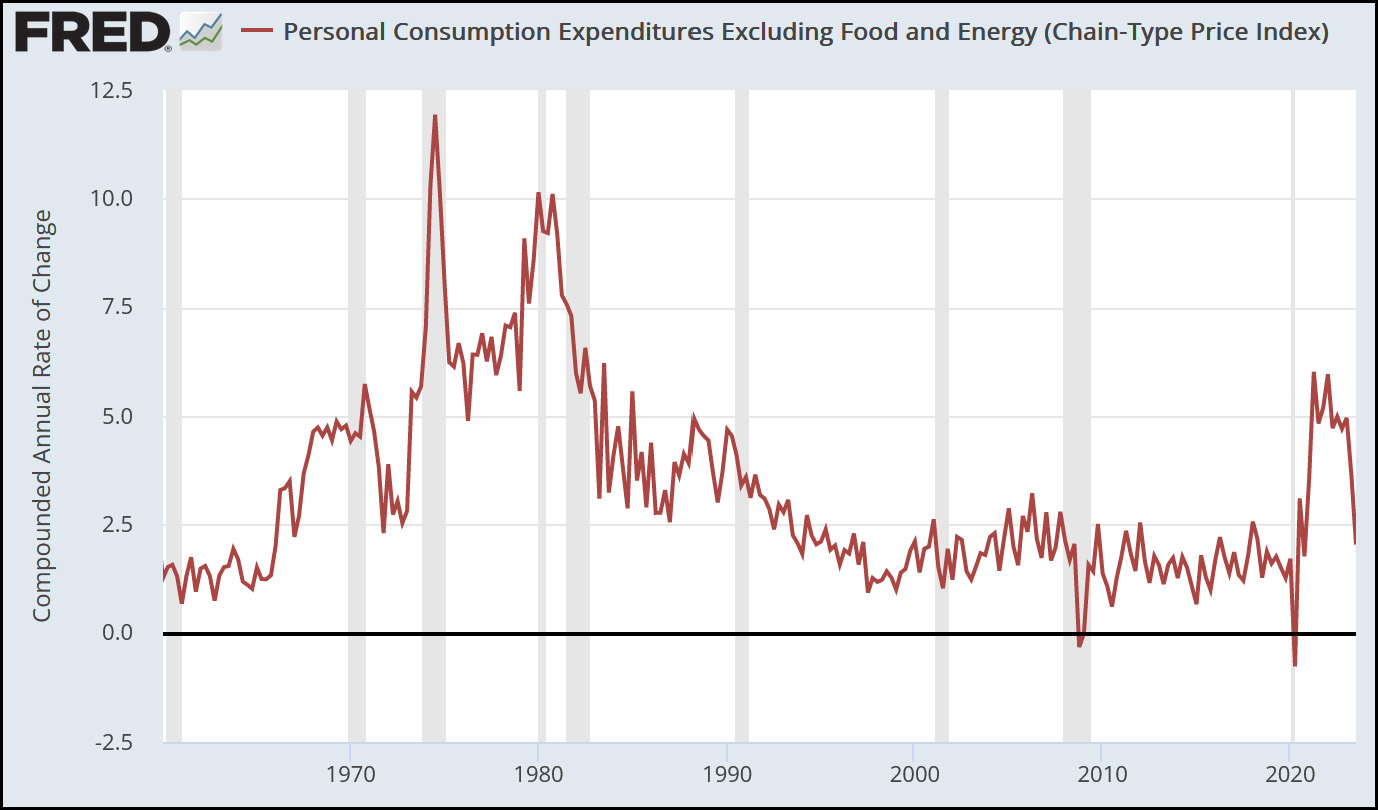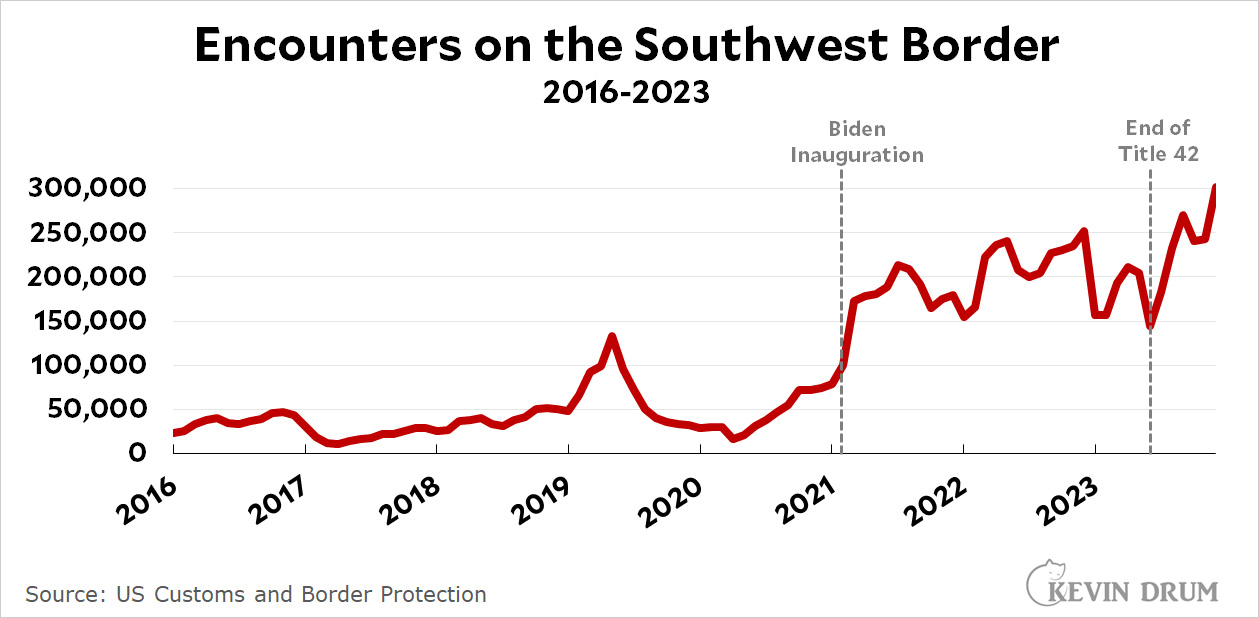I don't generally like to go back and forth on a single argument too much. After both sides have had a couple of chances to have their say, I usually feel like that's enough. Further bickering just ends up going down a rabbit hole.
But today is an exception because it gives me a chance to make a broader point. Bob Somerby agrees with Donald Trump that our country has become incapable of solving even the smallest problems. By contrast, I think the United States, even now, is a problem solving machine. Here is Bob for a second go-around:
It's hard not to be briefly angry about some of what Kevin wrote. Murder rates, inequality, medical costs? The southern border and its spread into overwhelmed northern cities? The young female medical workers we overheard this Tuesday morning talking about the ways their relatives have dealt with various carjackings? When are we going to solve the nagging problem afflicting them and their family and friends?
It can be hard to avoid being briefly angry when Pollyanna arrives on the scene, saying we just haven't managed to solve that one yet. That's especially true when the whole blue world is warning us that our democracy will be taken away if Trump returns to the White House next year, as polling suggests he may do.
We're big fans of Kevin's work, though we think he's become a bit too sure of the idea that Nothing Much Is Actually Wrong and that every question can be settled through the use of statistical measures. (Needless to say, he may be right on both points!)
The big dilemma here is how to keep two thoughts in our heads at the same time:
- The United States (and the world) have a lot of big problems.
- There are always a lot of big problems. We don't have any more than usual, and probably even fewer.
I believe that both these things are true. This is decidedly not because I'm temperamentally cheerful. I'm chronically depressed (thanks Effexor!) and chronically fatigued (thanks chemotherapy!). I mostly think the moral character of the human race has only barely improved since we were fighting over bananas in the treetops.
So why do I believe that things are pretty good these days? It's partly because I'm interested in history—which, admittedly, can be a two-edged sword. On the one hand, it provides perspective, which can be a calming influence against the doomsayers. On the other hand, it can produce a world-weary belief that nothing is ever new. It's a needle you just have to do your best to thread.
It's also partly because I'm interested in numbers. Again, admittedly, I'm keenly aware of the dangers of impersonal, data-driven analysis. There are straightforward technical issues to be aware of, like reliance on averages that don't pick up on growing extremes. And there are fuzzier issues to be aware of, like missing out on emotionally-charged trends that will never show up in data tables.
At the same time, you can be deeply misled by ignoring numbers. We humans like to believe whatever we like to believe. But if you want to evaluate the world honestly, you need something to test your beliefs against. Like it or not, your best bet for that is a cool, evenhanded look at the strongest data you can find.
Right now, for example, inflation is about back to normal. It just is, but the only way to know that is to look at the numbers. Does that mean anger over inflation is gone? Of course not. But that anger, as real as it is, doesn't affect the ground truth that our recent inflationary surge was relatively short and mild. You can believe both things at once. You don't have to let the anger prompt you into a denial of reality.
 Now back to problem solving. Bob mentions the current threat to democracy as an example of our inability to solve problems. It's true that people on both sides are screaming about this, but it's always been overblown. The Supreme Court handing down decisions you dislike is not a threat to democracy. The Electoral College—now in its 236th year—is not a threat to democracy. Joe Biden winning the presidency is not a threat to democracy. Electoral fraud—which is all but nonexistent—is not a threat to democracy. An attempted coup is a threat to democracy, but certainly less so when literally every branch of government summarily rejected it and Democrats have performed well in three consecutive elections. So while we haven't yet solved the democracy problem, we're surprisingly well along the way. Likewise, although right-wing populism remains a threat globally, the world has taken plenty of large steps toward rejecting it.
Now back to problem solving. Bob mentions the current threat to democracy as an example of our inability to solve problems. It's true that people on both sides are screaming about this, but it's always been overblown. The Supreme Court handing down decisions you dislike is not a threat to democracy. The Electoral College—now in its 236th year—is not a threat to democracy. Joe Biden winning the presidency is not a threat to democracy. Electoral fraud—which is all but nonexistent—is not a threat to democracy. An attempted coup is a threat to democracy, but certainly less so when literally every branch of government summarily rejected it and Democrats have performed well in three consecutive elections. So while we haven't yet solved the democracy problem, we're surprisingly well along the way. Likewise, although right-wing populism remains a threat globally, the world has taken plenty of large steps toward rejecting it.
It is so, so easy to fall into despair. There are so many things we care about that we feel helpless to fight. There's so much human suffering, so much bigotry, so much war. In the political realm, the other side always seems powerful, monolithic, and relentless, while our side seems weak, divided, and uninspired. Both sides believe this. Add to this all our endless personal problems and our endless talking about them. It really can seem like things are falling apart.
But that needs to be tested against something. How much of it is the product of your day-to-day mood? Or spending too much time with Fox News? Or the general bias of the media toward the negative and sensational—which can fool you just as much as anyone? Or plain old recency bias? Problems today naturally seem worse than problems a century ago, and problems that affect you naturally seem worse than other people's problems. But do you really think America is a beaten giant? Have you even tried to overcome your personal mood and take a step back? Have you considered the fact that h. sapiens was practically designed to gripe constantly—so it means little that people have lots of complaints these days? Do those cold, impersonal numbers I post all the time sway you at least a little bit?
The lessons of history are hard because you have to remember history. Most of us don't, even from only a few years back. And the lessons of numbers are hard too, because for most of us they have no flavor. A hundred charts about crime aren't as persuasive as a single neighbor whose house was burglarized.
This is just human nature. None of us can overcome it. But we can at least try. And when you do, a whole new world opens up: You discover that an awful lot of things you believed aren't really true. Airplanes aren't falling out of the sky. Our educational system isn't a disaster. Crime isn't rampant. The economy doesn't suck. Social media doesn't turn our teens into suicidal wrecks. The world hasn't rejected democracy. Joe Biden isn't wildly unpopular. Electoral fraud isn't widespread. Young men aren't in crisis. The number of people who can't afford health insurance hasn't gone up. Remote learning didn't ruin our kids. The cost of college hasn't skyrocketed. The dollar isn't collapsing. Wages aren't going down. The poverty rate isn't going up. The safety net isn't in tatters. Income inequality isn't still widening. The carjacking rate hasn't gone up. Job satisfaction hasn't gone down. Bullying hasn't surged. Terrorism isn't increasing. Millennials aren't earning less than their parents. Democrats didn't steal the 2020 election. Discretionary federal spending isn't spiraling out of control. The startup rate of new businesses isn't going down. Teen pregnancies aren't rising.
Some things you think are bad really are. Only a fool would deny that. But not nearly as many as most people think. And there are lots and lots of positive developments to even things out. You just have to be willing to open your eyes and see them.









